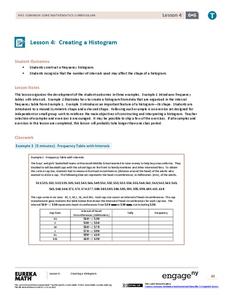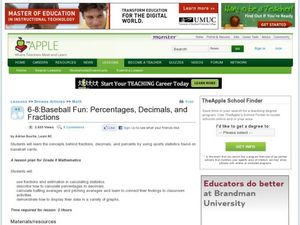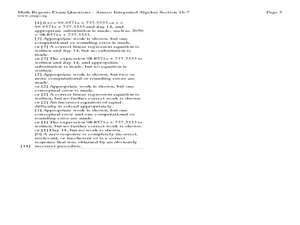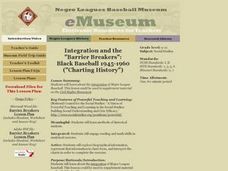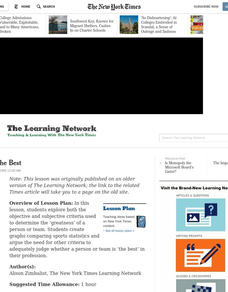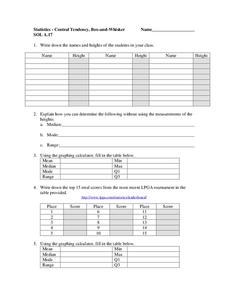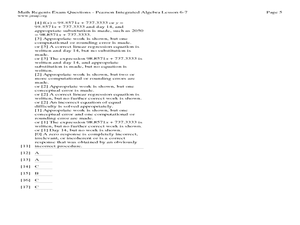EngageNY
Creating a Histogram
Display data over a larger interval. The fourth segment in a 22-part unit introduces histograms and plotting data within intervals to the class. Pupils create frequency tables with predefined intervals to build histograms. They describe...
Curated OER
6-8 Baseball Fun: Percentages, Decimals, and Fractions
Students practice the concepts behind fractions, decimals, and percents by using sports statistics on baseball cards. In this baseball math lesson, students use fractions and estimation to calculate statistics. Students calculate batting...
Curated OER
Fourteen Math Regent Exam Statistics Questions on Scatter Plots and Linear Regression
For this linear regression worksheet, students solve fourteen Math Regent Exam questions regarding scatter plots and linear regression. The solutions are provided.
Curated OER
Math is Everywhere! Post Test
In this math test worksheet, learners complete 10 multiple choice questions covering a wide variety of math concepts. An answer link is included.
Curated OER
Math League Baseball: Five Week Project
Eighth graders analyze how to use statistics, change fractions to decimal, and graph their statistics. They draft players from Major League Baseball eams and chose on player for each position, including 3 oufielders and one designated...
Curated OER
Play Ball!
Students pretend as if they have been hired by the commissioner of Major League Baseball. Their task is to explain the mathematics of baseball so that more people enjoy the game.
Curated OER
Integration and the "Barrier Breakers": Black Baseball 1945-1960
Students explore integration of Major League Baseball, identify important individual baseball players who played key roles in integration, and analyze historical information through charts, graphs, and statistics.
Curated OER
New Kids in The Hall
Students assess the role of statistics in determining those athletes chosen to be inducted into the Baseball Hall of Fame. They work in small groups to calculate, chart, and graph various statistics for different Hall of Fame members.
Curated OER
Simply the Best
Young scholars determine whom they consider "the best" performer in a variety of entertainment industries and discuss how to accurately measure greatness. They create bar graphs comparing statistics of the 1975 Cincinnati Reds and the...
Curated OER
Introduction to Scatter Plots and Correlation
High schoolers examine the concept of scatter plots. They compare baseball statistics to locate the ones that correlate with winning, and identify the positive, negative, and no correlation in sets of data using MS Excel.
Curated OER
Play Ball
Students calculate baseball statistics and ball field dimensions. In this Pythagorean Theorem, percentages and metric conversion lesson, students are given formulas to find earned run and batting averages for White Sox baseball players....
Alabama Learning Exchange
The Mean, Median, and Mode Chain Gang
Students analyze a set of data. They work in cooperative groups and use chain links to identify the mean, median, and mode of the chain.
Curated OER
Go Yankees!
Students use the internet to research the New York Yankees baseball team. After gathering their information, they discuss the challenges faced by the team and how they were overcome. They end the lesson by examining the math and...
Curated OER
Batting the Unknown
Students use batting averages to provide a measure of a player's past success. They use Algebra to calculate required performance to improve the average. Students compare baseball batting statistics early in the season and late in the...
Curated OER
The Majors and the Minors
Students create ways to compare and contrast major league and minor league baseball players using statistical tables. Video segments spur a discussion on the differences between a major league player and a minor league player. Students...
Curated OER
Central Tendency
In this central tendency worksheet, students solve and complete 10 different problems that include measures of central tendency. First, they write down the names and heights of students in their class. Then, students explain how they can...
Curated OER
Balancing the Scales: Understanding Ratios
Students are introduced to the concept of ratios. In groups, they convert sets of numbers into a ratio. After practicing, they use the ratios and proportions to solve story problems. They also calculate map distances and discover map...
Curated OER
Lesson 6-7: Scatter Plots and Equations of Lines
In this scatter plot instructional activity, students examine tables and write a linear equation that matches the table. Students graph linear equations. They read scatter plots, determine the trend line, and write a linear...
Curated OER
Decimals and Batting Averages #6
In this decimals and batting averages worksheet, students compute 9 batting averages to complete the chart, then answer 5 questions about the data in the chart.
Science Buddies
Science Buddies: Baseball Bat Debate: What's Better, Wood or Aluminum?
Science and math abound in baseball. In this project, you can produce some interesting baseball statistics of your own and perhaps settle a long-standing debate. You'll set up experiments at your local playing field to find out which...
Other
Wake Forest University: Sports Statistics
A collection of WebQuests that require students to collect and analyze statistical data from several sports teams using the Internet. An interesting, real-world approach to statistics.
Science Buddies
Science Buddies: How Do Baseball Stadium Dimensions Affect Batting Statistics?
Here's a fun project that combines baseball and math. Major League baseball is played in ballparks that have their own individual quirks when it comes to the exact layout of the field. Fenway Park in Boston has the famous "Green Monster"...
PBS
Pbs Teachers: Sports and Math: Batting Averages and More
Set up a spreadsheet using a computer or graphing calculator, and perform calculations using columns. Calculate percentages and solve a system of equations regarding baseball statistics.
Other
Web Quest: Take Me Out to the Ball Game
This is a WebQuest written by Susie Hallar of the Warrensburg Schools in Warrensburg, Missouri. Students research 10 famous baseball players, then use the information they find to compute averages, standard deviations, central...


